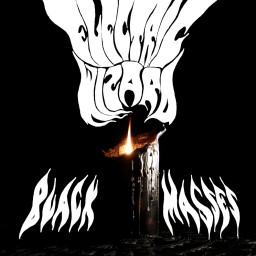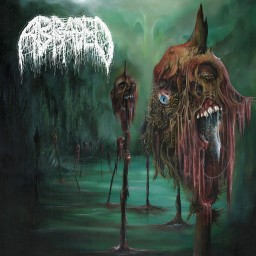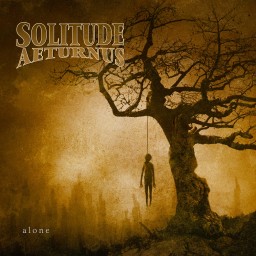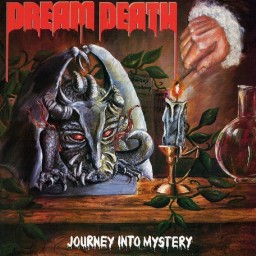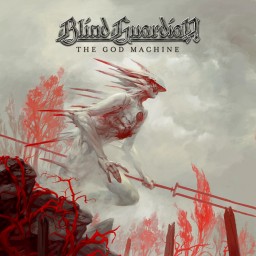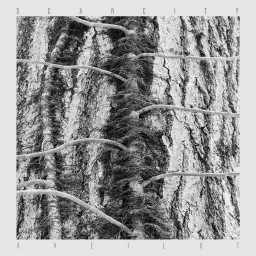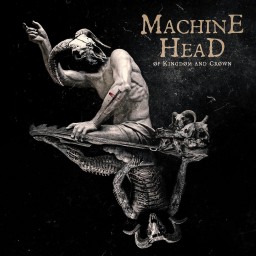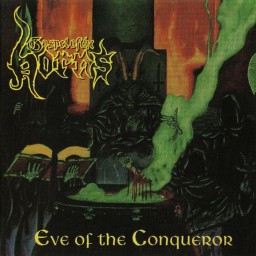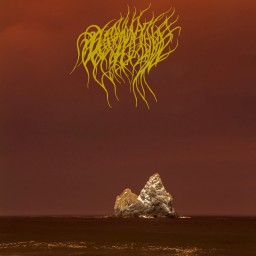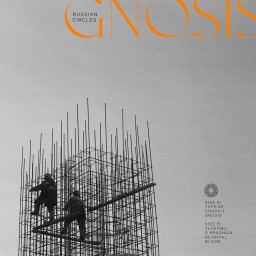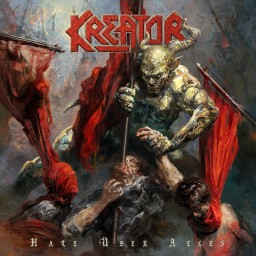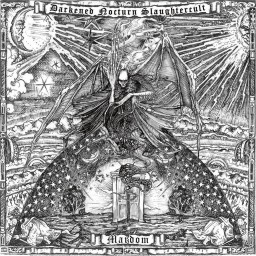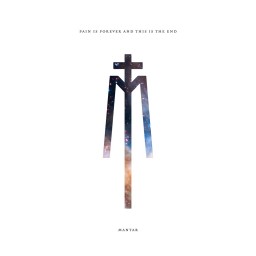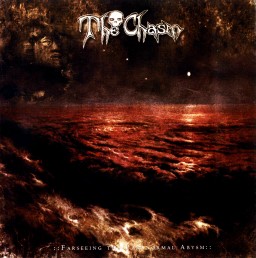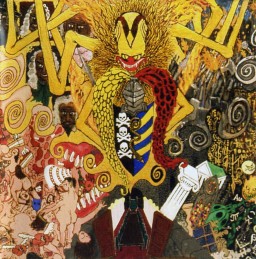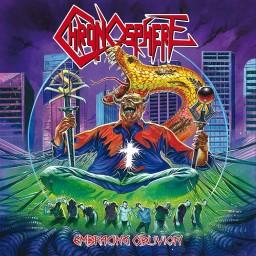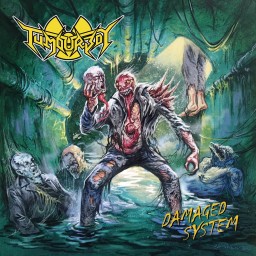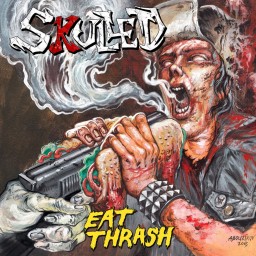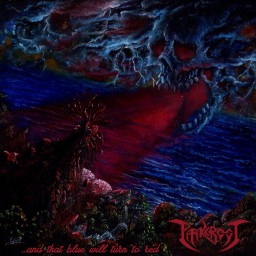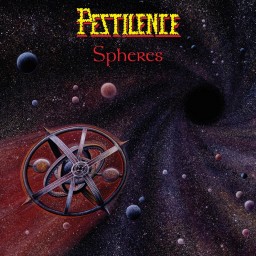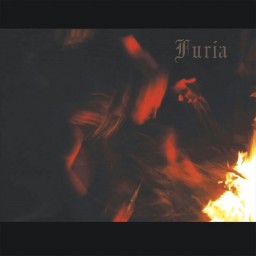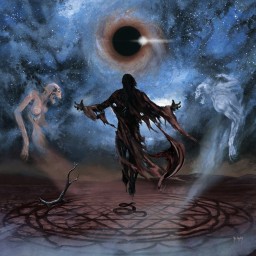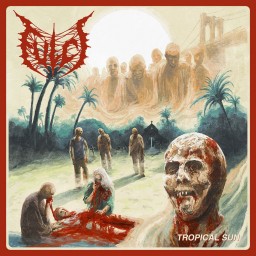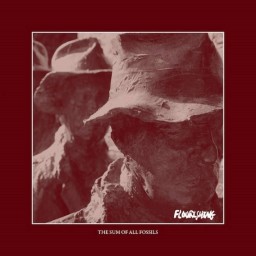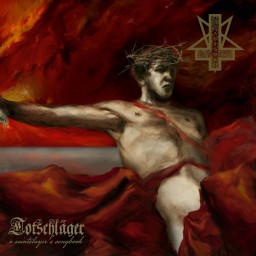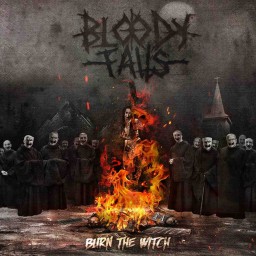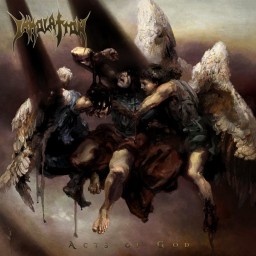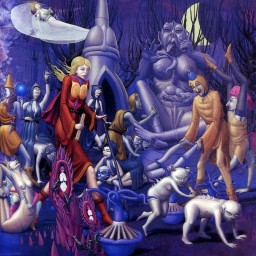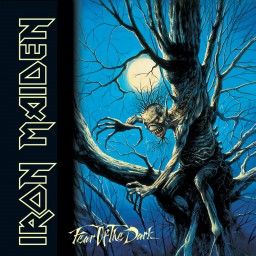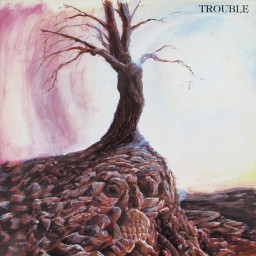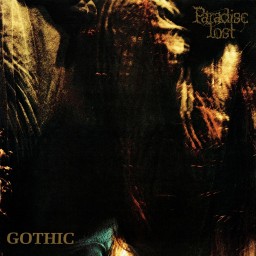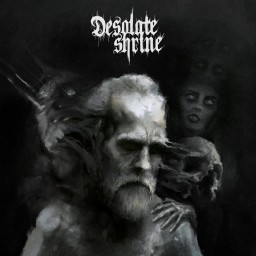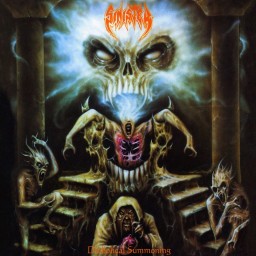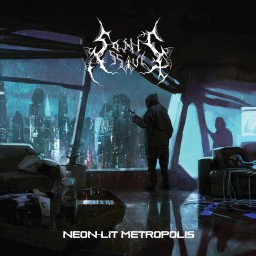Vinny's Reviews
I feel enough has probably been said already about Electric Wizard on most internet review sites in terms of the (deserved) adulation they received for the likes of Dopethrone or Come My Fanatics. For a period, Electric Wizard seemed to be everywhere, occupying endless “What are you listening to?” or “Recent Purchases” threads on the various internet forums I frequented some ten years ago. There was a sense that they were a band who could do no wrong (although the same collective conscience on the internet all seemed to simultaneously recognise the failure that was Wizard Bloody Wizard), a group who had hit their sweet spot in the realm of occult-ridden stoner/doom metal and consistently churned out the cursed vibes to the baying masses.
After a brief break from metal back in the late noughties I returned to the scene and decided it was time to bring Electric Wizard into my world. Never having really explored any stoner/doom metal before, Black Masses was the record that almost tipped me into the world we all know here as The Fallen. I played the shit out of this record, mostly because I was flat broke and my listening choices were limited (at least until I discovered Bandcamp anyways), but also because for the first time the hazy darkness and fuzz that emanated from this record soaked me up and I simply ‘got it’. Black Masses was one of those records that just clicked with me, better then anything else that I have listened to by the band – even the mighty Dopethrone.
To this day I still find desultory comfort in the arms of Venus in Furs, still feel a nerdy coolness to the b-movie atmospherics that imbue the whole hour run time of the record; Black Masses more than makes me want to shut all my curtains in the middle of the day and watch endless Hammer Horror! Rarely moving beyond a death march plod throughout eight tracks, Electric Wizard still manage to provide consistent entertainment without breaking that much of a sweat. What sounds lacklustre or half-hearted to some is in fact evidence that EW did what they did so naturally back then that they could afford themselves a little bit of arrogance in their playing.
Who cares that Patterns of Evil is more than a tad cumbersome in its arrangement, the multitude of component parts clashing with each other at various points, when it all sounds so disturbingly relaxing at the same time? A lot of the success here for me is down to Jus Osborn’s vocals. Dialled perfectly into the mix without getting lost in the density of the instruments they act as a creepy and pained accompaniment to the music. The combination of his and his wife Liz Osborn’s leaden riffs are imperative to the sullen and hopeless aspects of Satyr IX, seeped in psychedelia and gloriously comforting in their enshrouding nature.
If finding peace in darkness and dankly lit places is your bag, then there is plenty to go at on Black Masses. It is sombre without being draining, evil without being overtly nefarious and enriching without the need for ‘nice-to-haves’ such as variety and progression to unlock it rewards.
Genres: Doom Metal Stoner Metal
Format: Album
Year: 2010
If the album artwork was not clue enough, Abraded play butt-fuck ugly death metal in the vein of pretty much all of Maggot Stomp’s roster. Not content with the bludgeoning best of what death metal has to offer, the Cleveland based trio throw lots of grinding goodness into the mix as well. Things somehow sound clean as a whistle in some places though, despite a filthy production job that gives the requisite levels of grime you would expect, the d-beats that thump away at you brain might as well be in the same room as you when you are listening.
Grisly and vile vocals rasp over mining riffs and rumbling bass lines to give the whole experience a complete feel. At only twenty-minutes long it is over all too quickly and you feel too fetid to put it back on without showering first. Put your scruffs on, this one’s a real platter of splatter guys! Ugly, extreme and straight to the fucking point! Fuck yeah!
Genres: Death Metal
Format: Album
Year: 2021
As I have commenced my exploration of The Fallen clan it seemed sensible to pass comment on this month’s feature release, especially given the high praise it has received to date. The caveat I must add here is that I have sampled Solitude Aeturnus before now and found them not entirely to my liking. I saw these guys come up as a recommendation when searching for bands like Candlemass (who remain my benchmark in doom whom I usually chart my forays from). Stylistically the comparisons are usually spot on I must admit but considering the first four Candlemass albums are my genre-defining releases, Solitude Aeturnus have a lot to live up to.
On Alone I must comment on how nu-metal I find Rob Lowe’s vocals. Not to say that this is alternative or nu-metal in anyway, but I get flashbacks to listening to the likes of Life of Agony back in the 90s. That low vocal tone looms through in the slower moments and I cannot help but think of the sound of that very different sub-genre of metal music. Whilst we are on about the vocals, I do also find them incredibly whiny on here. Now, I know that is sort of the point and they are done deliberately like this to emphasise the melancholy of the music. However, whilst I can acknowledge the fine set of pipes that Mr Lowe possesses, I do find the vocals to be a real bug bear of mine.
It is not even as if the riffs rescue proceedings entirely. Huge though they are (and with a decidedly eastern/oriental theme to them for the initial few tracks here) I find that they are too melodic for most of the record, and I do find myself longing for the more heavy and bruising style of riffs I normally associate with this type of music. Rarely during the hour-long runtime of Alone do I feel like I encounter anything monolithic in terms of a crushing wall of doom, in fact for most of the time it plays like a heavy metal record with a heavy doom metal influence. Moments such as the opening of Is There and the Black Sabbath riff that opens Tomorrows Dead do fill me with hope but are mostly just empty promises.
Although it is all done well enough, I just do not fell that the band ever get beyond a jog here and that they should be capable of more given their obvious stature in the field of doom. Maybe with my recent departure from The Guardian clan, Alone is too near to that sound for my comfort nowadays and it would have perhaps sat better had I discovered it some years ago. Epic though it is, this record is somehow not captivating enough overall and I almost want to like it more than I actually do.
Genres: Doom Metal
Format: Album
Year: 2006
Some albums most definitely fit into a sub-genre yet at the same time manage to express an alienation to the core sound that seems to make them seem like they do not really fit at all. I cannot think of a better example of this than Dream Death’s debut release. It most certainly has thrash elements but at the same time has a real slant on doom metal. Often listening to it like you are listening to two different bands or a band that is so torn with its influences that half want to do thrash and the other half want to do doom.
It makes for an interesting album in some regards but overall, you cannot get away from the fact that Journey Into Mystery suffers from a lack of direction. The songwriting is not particularly stellar either to boot and so there is a real sense of conflicting purposes over the eight tracks. It is not that any one element is particularly awful, more that no singular piece gets chance at a full exploration or development to its full potential. Personally (even with my fledgling doom metal ears) these guys are a better doom band than they are a thrash band. In fact, on certain tracks (The Elder Race for example) there are no thrash metal elements to my ears. Indeed, post this record saw the departure of bassist Ted Williams and the remainder of the band elected to change their name to Penance and become a doom band.
As far as I can hear, their hearts were never really into thrash at all and all Journey Into Mystery did was prove this lack of conviction made the music suffer. I hear a lot of Trouble in those riffs and at times I struggle with the vocals as I do with Trouble’s debut. The vocals here are so clumsy at times that I find myself cringing. Lines get rushed through often leaving the odd word iterated in isolation and completely out of context. Accepting that this is a debut album, the vocalist is far too forward in the mix and sounds like he is deliberately shouting over everything else which just comes off as amateurish and juvenile.
Whether it simply their own version of uptempo doom or genuine attempts into thrash metal, Dream Death are all over the place here and it really does destroy any sense of flow. The best track on here is the heavily Celtic Frost influenced Hear My Screams, it deploys a consistency (barring that awful, snatchy solo) that the rest of the album is sadly lacking. Maybe back in 1987 this would have more props but come 2022 it certainly has not aged well.
Genres: Thrash Metal
Format: Album
Year: 1987
The poorly named Panzerchrist (really guys) have been stalwarts of the Danish death metal scene the mid-nineties. Their brand of blackened death, although not unique, is really well done and Regiment Ragnarok has soon grown on me with repeated listens. This, the bands sixth release, is stacked full of mining riffs, blasting drums and ghastly vocals and I can only assume this blueprint has served them well over the years as they sound tight throughout all twelve tracks which is no mean feat as only two of the band that performed on their previous album (some five years earlier) actually remained come their 2011 release.
In all honesty I found Regiment Ragnarok to be an unexpected joy. I mean, it certainly does not reinvent any wheels at all and it is very one dimensional in its themes and approach, yet it is sill entertaining. Their sound is reminiscent of Belphegor and Behemoth although it is Vader whom I find to be the best reference point for the Panzerchrist sound. At twelve tracks in length though the rinse and repeat cycle does get tiresome towards the end of the record and the album perhaps would have benefitted from a trim to make the whole thing easier to digest. However, Panzerchrist achieve a consistency to proceedings that none many others can hold a candle too and they are clearly accomplished enough musicians. Drummer Mads Lauridsen only stayed around for this one album but he is monstrous behind the kit and the twin guitar attack of Rasmus Henriksen and former Illdisposed man Lasse Bak is a tour de force at the same time. Vocalist Magnus Jorgensen (who was also only around for this album alone) spits a venomous performance on the microphone that underlines the blackened virtues of the band perfectly. With a more stable line-up I could imagine Panzerchrist could have ben more of a death metal household name (I had never heard of them before picking up this review), but with so much change seeming to occur from record to record it is hard to see how they could ever break out of this predictable cycle of songwriting.
Anyone who likes the war soaked themes of Bolt Thrower coupled with the mining sounds of God Dethroned would find Panzerchrist right up their street I am sure and Regiment Ragnarok is not a bad place to start with their discogrpahy to boot. You might not revisit it very often but each time you do the entertainment value will always be there at least.
Genres: Death Metal
Format: Album
Year: 2011
For their twelfth album in a career spanning over 30 years, Blind Guardian have finally delivered the album that probably should have followed At The Edge Of Time. That was the last album from the German power metalllers that I truly enjoyed and The God Machine succeeds in capturing the more simplistic elements of what came in 2015. The unnecessary pomp and circumstance of the last two albums appears to now have been ditched in favour of a more straightforward approach to some anthemic and memorable power metal and this is a decision that pays dividends for virtually the whole of the album. Now, there is no match here for Sacred Worlds, Road of No Release or Wheel of Time from the aforementioned 2010 release. Although there are anthems here, they lack the edge of what came before and the longer-standing fan will acknowledge that The God Machine does not challenge the imperial majesty of Imaginations From The Other Side but this is most certainly the return to form we have all been waiting for.
Structures here are uncomplicated and are not afraid to dip back into the earlier reference points of the bands sound (check out the speed metal riffing of Violent Shadows for instance) to breed a great sense of familiarity across the whole of the 9 tracks on show. Clocking in at 50 minutes, the album feels lean without being lacking in any area - indeed this is a beefy record for a sub-genre I usually find much to grumble about for usually lacking meat on its bones. Hansi sounds vibrant and strong throughout the record and seems to have found new life in his vocal chords as he approaches his late 50s. Like the guitars carry real presence whilst remaining at a tone that allows the more regal atmospherics to shine also. Frederik's drums do sound a tad stifled if I am honest but this does have the advantage of letting the riffs and leads take centre stage behind the vocals. Indeed the lead work saves Secrets of the American Gods which otherwise feels like the weakest link in an otherwise excellent release.
Listen to Architects of Doom if you have any doubts that Blind Guardian aren't back and your cynicism will soon be dismissed. For a band who I had feared lost to the annals of power metal history for good following their last two releases, The God Machine re-establishes a brand. I am even buoyed by the sentiment of ballad Let It Be No More - a track which showcases the strength of Hansi's voice perfectly. I don't care if Blind Guardian called time on their career right now as they would be going out on a record that does real justice to their illustrious contributions over the last three decades. Likewise, if this is the shape of things to come then more please.
Genres: Power Metal
Format: Album
Year: 2022
The taster-track I heard on The North playlist this past month turned out to be more of curved ball when I sat and listened to the whole record. My levels of intrigue soon dropped after the frankly boring opening track. I don't mind drone metal in all honesty if it sets up something interesting, however here it just seems to set up the scene for a Jute Gyte record. In all seriousness, the Jute Gyte reference is probably the most relevant one I can apply here. The problem with Scarcity is that they flirt with extremity as opposed to settling upon pursuing it. Yes, there is a wall of noise and scathing vocals that essentially sticks in the head for all the wrong reasons but the more droning passages are actually much better structured than the "kitchen sink" style musings of II (for example).
I cannot knock them for the effort behind the album as its introduction of psychedelic elements is novel if not all that intriguing for me. The softer use of tremolos feels a gimmick as well though, like we are teeing up a post-metal record that never comes and so we just drop into form references to black metal for the sake of it. I would actually admire the album more if it further distanced itself from black metal as it would feel like it was a more honest representation of what it was trying to do.
Aveilut is not challenging to my ears, it is just boring and bloated and constantly suffers from a lack of identity. Push away at the boundaries of extreme metal all you like but sometimes a bit of reflection wouldn't go amiss to ensure you at least maintain some sense of direction.
Genres: Avant-Garde Metal Black Metal
Format: Album
Year: 2022
My recent feature nomination of Machine Head's comeback album The Blackening, alerted me to the fact that Rob Flynn and friends had a new release out. Following the terrible Catharsis was always going to go one of two ways, with Flynn either again raising his middle finger to the metal world and doing another nu-metal soaked release or instead choosing to drop some more familiar sounding MH material from their more groove metal days. Hearing that Of Kingdom and Crown was a concept album immediately peaked some intrigue with me as (Burn My Eyes aside) the releases that I enjoy more from the band over the last twenty years or so have been the ones with the longer, better structured tracks (Imperium, Locust, Halo etc), so the prospect of a concept album should increase the opportunity of such structures, right?
Nope, it does not. Aside from album opener Slaughter the Martyr which clocks in at over ten minutes and is bloated to say the least, the majority of OKaC lacks anything in the way of expansion. What it does do - in order to answer the question above of which way has Flynn gone this time - is pick up right where The Blackening left off, adding requisite amounts of Unto the Locust and Bloodstone & Diamonds into the mix along the way. I do not know whether the phrase "a return to form" is valid though. A more accurate description feels to be that Machine Head have not failed twice in a row and whether you deem the album to be a success or not depends largely on if you agree that avoiding failure is a success.
Sound wise this is like the old MH line-up is back in place, which considering this is just Rob Flynn and some new members seems a little odd. Ex-Decpaitated and Vader (live) shredder, Vogg does not strike me as being given much in the way of room to stretch his legs and it might just as well be Demmel there alongside Flynn on guitar. Similarly, Alston behind the kit might as well be McClain, such is the familiarity of the sound here. This is not to say that all nu-metal influence has been dropped altogether from OKaC. Still bits seep through the core, stylistic groove metal that now dominates proceedings again, however there are a few surprises along the way. The blackened, melodic death metal riff of Become the Firestorm for example caught me off guard, unfortunately so did the awful clean singing that briefly punctuates an otherwise perfectly acceptable song with some unnecessary elements of cringe before we get a decidedly nu-metal sounding melodic section to set up the ferocious lead work.
The album also has three interludes which do nothing for me. If you are balls deep in the storyline (which it will surprise nobody to hear that I am not) then I guess they add value for you, otherwise they are just distractions and detractions from the flow of the record. There is also too much of a reflective element to the record also. Chanting intros and clean singing are a skill to place in any metal record and here they just do not work. I would be far happier to just enjoy the intensity of the tempo and get my fill of groove metal riffs as opposed to hearing Flynn explore his vocal range. In short more of the riffs on Unhallowed as opposed to the hazy singing please.
And so to the scores on the doors. In all honesty I struggle to give OKaC a low score. Based on the step up from Catharsis and the odd nostalgic pillow I always seem to rest my head on when I revisit any of the bands past releases, OKaC hits enough references from the groove metal days to satisfy me. The obvious cries out for mainstream accessibility (such as the aforementioned Unhallowed) still annoy the hell out of me though and nostalgia is not usually something that I allow to excuse mediocrity. Three stars seems reasonable under the circumstance as whilst I acknowledge the improvements made from the previous release there is still some way to go.
Genres: Groove Metal
Format: Album
Year: 2022
Australia's Gospel of the Horns are no longer an active band since 2018 having been around in blackened thrash circles since 1994. They are basically of the same sound as fellow countrymen Destroyer 666 or for a more further geographical reference, Desaster are also a good citation. Unlike either of the two aforementioned bands though, this is not as vicious in its delivery, almost like the low production values actually rob it of some power and presence. Now, don't get me wrong, this tries to be as grim and rough as the best of them. Howitzer's vocals are superb with their rasping (ravishing) grimness and Marauder's riffs are equally as cold and.....marauding. My only real criticism (aside from him calling himself Hellcunt) is the drummer sounds a bit lost in the background, and overall there is just a sense of there being a lack of sharpness to their bite.
As an EP, this works on a quick "smash 'n grab" level of entertainment. Just as GOTH get their hobnail boots and fist-band and chains to the bar, they sup up and are off to lay waste to some other drinking establishment. The synthy, atmospheric outro with its weird alien/subliminal devil speak is unnecessary as they do not strike me as a band who rely on pomp or circumstance to get their point across. At the same time the band certainly do not reinvent any wheels and as a result (having heard more than my fair share of this sub-genre by now) large parts of this EP just pass me by. It falls all too easily into the "Hells Headbangers" atypical trve/kvlt blackened thrash brigade - which in itself is a great place to be, but one that is well-trodden already for me.
Genres: Black Metal Thrash Metal
Format: EP
Year: 2000
I have listened through this release some three or four times now and I am still at the same level of understanding of it as I was after one listen. Aylwin play acceptable but unremarkable atmospheric bm, yet for some reason feel that showcasing this in one thirty-minute track is necessary to capture their sound. I am almost sure though that this track has three individual parts, so I am unclear as to why this all got put into one track.
Starting and ending with the sounds of waves hitting a shoreline (a sound which is revisited during the track also) simply pans out two-minutes of play time before they ever get to the opening riff. Although this start seems representative of the artwork that depicts some monolith-rock formation in the middle of a vast expanse of water it doesn’t really marry up with anything else. The brighter light of the artwork is carried through into the music I suppose as this is not particularly grim bm really.
It lacks quality that justifies the constant play of one track though. It never successfully combines the instrumentation and atmospherics into any triumphant pinnacle or peak. The nearest we get is a lull in the middle of the track when some melodic strings compliment the atmospheric ocean theme before we crash back into a soaring bm tremolo riff. Even as individual parts the instruments lack anything outstanding in the way that they are performed and so there is no real sense of cohesion, and these guys are not the tightest of players when it comes to being a collective. I find it hard to take The Arch Holder seriously as a release as it sounds like a rehearsal with some atmospherics thrown in for the hell of it.
There is no richness to the riffs, no subtlety to the transitions and the cavernous and gruff vocals just get lost in the maelstrom as opposed to underlining the emotion behind what is being performed. I sense that if I had four, thirty-minute slots of my life to dedicate to this in one sitting each then I might be more enamoured with it. However, without anything tangible to grasp as a high-point I struggle to see the need for such a lengthy release in all honesty. Just breakout the tracks guys.
Genres: Black Metal
Format: Album
Year: 2021
French metallers Celeste offer a consistent and uncomplicated brand of sludge driven, post-hardcore with just enough blackened edges to keep them in The North clan on album number five. Full of nihilistic and despondent tones, the tremolos on Infidèle(s) have a bleak warbling effect alongside the more prominent percussion and intense sludge vocals. As such the consistency adds to this bleak element in the sense that it offers no real variation of sound. This does make the album a bit of a slog to get through in all honesty, yet it still helps retain the pervading sense of darkness end to end on which the album thrives upon.
Singing in his native tongue, vocalist Johan deploys a hardcore-like ethos to his sludge-styled vocals that works well given how far forward in the mix they sit without dominating the sound overall. Guitarists Sébastien and Guillaume do a great job of creating a wall of riffs when needed (check out the Russian Circles’ elements of (I), a purely instrumental track of monumental proportions). The solid drum work of Royer underlines the sound of this tight unit who pay with a passion that does not require any exuberance to get their message across.
Infidèle(s) is solid record that lights a few fires along the way. However, they do not burn very bright or for very long in terms of leaving a lasting impression. As soon as the record is over, I forget about it and move onto something else, which is not to say that it lacks merit more that it just does the same thing well far too often and leaves no real standouts for me to grasp onto.
Genres: Black Metal Sludge Metal
Format: Album
Year: 2017
Instrumental music has a short shelf life for me usually. I find it really does grate on me a lot of the time especially when it is done during an album that is predominantly showcased by lyrical tracks. I am not talking about 00:58 duration interludes, intros or outros here though. I am referring to lengthy tracks of usually repetitive and unimaginative passages that just do not seem to fit. Bizarrely, when done well enough, I have no problems with whole albums of instrumental only tracks. Russian Circles of course being pioneers of this style over many releases, yet somehow I had missed them altogether until 2019's Blood Year found its way into my world.
I bought Gnosis on vinyl based on the track Conduit as the only teaser I had heard, having enjoyed the amazing video that accompanies the track. Whist I accept that for some, this is just an instrumental album and in fact I do agree that any instrumental album can only go so far, at the same time Gnosis goes more than far enough for me. It strikes me that it manages to speak to me a lot better than many lyrics do in all honesty because Gnosis for me is a very big, very loud and very interesting safety blanket. My anxiety is off the chart this evening and the warm and welcoming structures of this album have more than proven their value in this thirty-nine-minute window of precious time sat alone trying to rationalise my racing brain. There is a soothing balm to the fuzzy edges of those guitars and those dissonant chimes that ride over the waves of huge riffs are like the stardust in the rings of Saturn itself.
Mental health assistance aside, Gnosis is a success because it is not only so easy to connect with emotionally but also because it is so intelligently put together. This sounds like a band in control of their influences and who are able to sustain a tight level of playing with what ever style they throw up. Whether it is indie vibes, sludgey onslaughts or near death metal-paced riffing, Russian Circles have it all under control and have a knowledge of pace that is fundamental to the triumph of the record. A psychedelic haziness hugs the edges of most tracks with a grasp that allows the progressive and post-metal structures to really build and thrive. One of my favourite releases of 2022 so far.
Genres: Post-Metal
Format: Album
Year: 2022
The more I hear from bands that formed a significant portion of my listening habits over the years the less impressed I become. Kreator’s first five albums, although not flawless, are one of the most consistently developing paths in my thrash metal journey. Granted after this, things waned on the success front (for me at least) and so catching up with them now in 2022 and hearing the bag of parts that constitutes Hate über Alles brings with it the realisation that Kreator are best left confined to those 80s and early 90s pinnacles.
Kreator in 2022 have lost a fair old amount of their thrash and large parts of this album are meandering heavy metal tracks that sound like they have been written by a band with far less experience than the 40 years of activity amassed in the German’s ranks. Whilst there are most definitely tracks here that hark back to their thrashing heyday like the title track, there are deceiving tracks such Conquer and Destroy that starts promisingly but is cursed with a meandering middle section that it never recovers from. There are also absolute turkeys such as Become Immortal and Midnight Sun.
Reading an interview earlier with Mille, he mentions that he has written over 170 songs in his lifetime and there is not much more in the tank. He’s right based on the majority of the eleven tracks on display here. I would estimate there are eight tracks here that are absolute skip-fodder with some of them holding little if any appeal for even the more modern thrash metal fan. Even if fist-pumping anthems are your thing, I am not sure the effort involved to get to these fleeting moments of memorability are worth it in all honesty.
Genres: Thrash Metal
Format: Album
Year: 2022
Containing members of Bethlehem and Purgatory, the grandly named Darkened Nocturn Slaughtercult host a plethora of experience amongst their ranks, and this shines nicely on Mardom, the bands sixth full-length release. Think the chaotic and ritualistic vocals of Mayhem and Bethlehem, combine this with the blasting fury of Gorgoroth and the relentless execution of Marduk and you are close to the sound of DNS.
After being diagnosed with breast cancer and subsequently overcoming the illness in 2021, DNS vocalist Yvonne Wilczynska (Onielar) shows why she is so deft at fronting Bethlehem with her grim and ghastly vocals shrieked over the wall of tremolos and blastbeats that make up Mardom’s ten tracks. Unafraid to drop the tempo down a few gears every now and again, tracks like A Beseechment Twofold really show how the band can grow a track into a nefarious number. Onielar’s clumsy vocals sitting perfectly atop the varied soundscape on this track showing the accessibility of the unclean vocals should you take the time to listen to them.
This, the longest and best track on the album is a great centrepiece to the record and sets up the final half superbly. The strong bass presence on The Boundless Beast help accentuate a hint of progression in the middle section of the track before we land back in that much more familiar blasting territory. The atmospheric palate-cleanser, Widma tempers the final third of the album nicely with a simple yet effective use of cavernous drone and vague, dissonant flurries.
Comparisons with Bethlehem seem almost inevitable, but DNS come across as being in control of their art as opposed to just blasting by with devout insanity to lead the way. They are almost certainly a conventional black metal band, yet they are an artist with one eye firmly on composition and the strength that can be released from adding variety here and there also.
Genres: Black Metal
Format: Album
Year: 2019
Although I have seen various covers for Mantar releases over the years I only joined the dots to their music this past week or so. The world of sludge, whilst far from unfamiliar to me is also not a regularly trodden path for me either. Having no past experience of the band made listening to Pain Is Forever and This Is The End quite an organic experience and what started out as a cursory listen off the back of an interview I read, soon become a regular play most days. It is not often that an unplanned listen breaches my (albeit lose) code of using Trello to map out my listening but Mantar have a sort of ugly catchiness to them that appeals to my dark heart I guess.
Whilst I would not say that music like Mantar's is the reason that I got into metal, it most certainly is an example of why I have continued to listen to this form of music for over thirty years. PIFaTITE is a dirty record. It is full of middle finger in the air, raised to the entire world, calling out all the bullshit of life from the highest rooftop. The irreverence it has is mature in form and is not simply angry grown men shouting about how unfair or unjust things are. It is a record that pricks at your skin as opposed to slicing or slashing it, like a cat kneading your flesh for attention, its claws just catching the very surface of your skin without needing to penetrate too far to get the result it craves.
The infectious nature of tracks like Hang 'Em Low (So the Rats Can Get 'Em) and Grim Reaping draw their hooks across you as opposed to just burying them in and in a way this is the flaw of the record. Once I have been infected by these hooks, I want more. By way of comparison, there are other tracks on here that I still cannot hear as I look at the tracklisting despite me having played this album for a week at least twice a day. Of Frost and Decay and Horder just have no memorability and this creates a sense of imbalance on the record.
Still, I cannot get away from the fact that I thoroughly enjoy this in the main and it will probably be on my rotation list for a few more weeks to come. They are on my Trello board now at least.
Genres: Sludge Metal
Format: Album
Year: 2022
On paper there is a fair old bit for me not to like on this record. A heavy instrumental stake in proceedings, all manner of influences from progressive through to black metal incorporated into tracks that rarely drop below six and a half minutes in length and a not always very tidy performance either. Most of these things in isolation can kill an album for me. Give me consistently long tracks and you must keep them interesting, but at the same time do not just throw shit everywhere that comes as influences from multiple sources just to mix it up especially if you do not have the necessary ability with your instruments to carry it off.
Fact is though, that for the most part at least, I enjoy Farseeing the Paranormal Abysm a fair old bit. There is an undeniable charm to the rough edges that are so obviously on show. Whether this is a conscious effort or not I would not be able to even guess but they give the album a feel of a band showing true heart in trying to expand their horizons beyond their current prowess as musicians. Admirable though this is, I can see how this is a curse to the ears of some listeners as it is a gift to mine.
Although not normally my bag the instrumentals here do bristle with energy and create a tangible sense of texture. They do not stray into the realm of being simply “showy” or grandiose (the limits to the artistry sorts that) they feel more robust and vaguely mechanical. This description probably does not do them sufficient justice as they are most definitely not boring, they are too charged with spirit for that, but they are almost like captures from a rehearsal or jam session thus giving them organic appeal.
As such I do not see the album as a regular release. It plays more like a compilation with some similarly themed tracks slotted besides each other that did not make the cut on previous releases. Not being the biggest fan of compilations, this again is a risk that somehow pays off here as I can comfortably sit through the album in one sitting. It is an album that carelessly arrives at success despite a few stumbles along the way (what the fuck is that title track about?) and the shifts of tempo on occasion sounding more like lurches. Structure of the Séance, ironically, lack’s structure and just feels like a relentless gallop with several time-changes thrown in. They might not have been the most capable musicians at this stage in their career but the gusto with which they approached this album is worth at least a nod of recognition, even if the overall product has more than obvious flaws.
Genres: Death Metal
Format: Album
Year: 2009
Icelandic black metal. The sound of dissonant fury and endless, bone-shattering winter lit up by the insomnia-inducing midnight sun. The maddening gait of Misþyrming (meaning “abuse” or “mistreatment”) that borders somewhere between melodic black metal, and some not-quite post elements is a pleasure to behold in the right mood. Seemingly endless in those rolling, repetitive and luxuriously grim riffs, Algleymi offers a stark listening experience that constructs a minimalist aesthetic with a light sheen of polish to provide some real defined edges.
The drums on here are really understated and this works well. Although most certainly there, I find I feel them more than I hear them and in doing so I can focus on the guitar and vocal work more easily. Comparisons with Furia are inevitable if you listen to those vocals when coupled with that chaotic maelstrom of guitars that break into almost catchy rhythms or melodic passages to temper the albums busier tempos.
Unafraid to experiment, Misþyrming drop in some random death/proto-surf rock instrumental in the middle of the album which manages to create its own little reflective atmosphere in the running order. However, for the most part this is an album of diving and driving guitars that swoop like birds of prey on the listener as the bass hums along in its insect-like expressions. Like the drums, the bass is understated yet at the same time remains a key contributor, an element that you somehow do not have to hear clearly in the mix to understand that it still carries a presence.
There is certainly more here than just tremolos and blast beats to contend with. Atmospheres and the production job overall allude to some muted grandiosity that is constantly being measured and kept in check so as to not ruin what is a consistent and addictive eight track release. Worth mentioning that this has taken a few listens for it to eventually land with me and there have been periods of months often between listens in all honesty but the determination has paid off.
Genres: Black Metal
Format: Album
Year: 2019
My second outing with !T.O.O.H.! and I am still not sure exactly what the fuck is going on. Part of me wonders if I am just getting less tolerant of experimentation in my old age but then (perhaps the same) part of me thinks !T.O.O.H.! are just taking the piss. Dwelling beyond plain old deathgrind, the duo deploys some avant-garde and experimental elements into an album that I swear apes some well-known mainstream melodies but I cannot quite place them.
The progressive/technical elements are not that good in all honesty and when coupled with this continued penchant for experimentation they really do detract from the more appealing grind elements of the album. If they could tone down the odd ball direction and focus more on the more solid and consistent approach that I find myself preferring from them then I could probably give more time to this.
As it stands I have no idea how this album is rated so highly here on MA as it just feels like a jam session incorporating disparate styles and ideas and would probably be better left in the rehearsal room or recorded for the duos own personal attention only.
Genres: Death Metal Grindcore
Format: Album
Year: 2003
Ah Greece. The home of Hellenic black metal and oddly enough the latterly red-trousered thrash metallers known as Chronosphere. For some reason on their band photos all of the band are in red pants - I assume to do with the release that follows this one, Red n' Roll. Anyway, back in 2014, Chronosphere were not wearing red leg attire and managed to churn out a blistering album of decent quality thrash metal in Embracing Oblivion. Capturing a real sense of flow, these guys certainly know their thrash metal credentials and come blazing out of the blocks early on with Killing My Sins which isn't anywhere near as clunky as the name might suggest.
Although not anything new, Chronosphere take the classic elements of Testament and apply flashes of modern influences such as Havok and Warbringer to good effect. Vocalist Spyros Lafias is very reminiscent of Chuck Billy in his style and the rest of the band deploy gang chant backing vocals a la Exodus to support his fine pipes along the way. Lead guitarist Panos Tsampras certainly can play, filling the album with an array of classy leads alongside his chopping duties with Spyros. The drums are a bit too far back in the mix for my personal taste but they are audible still, I sense that Thanos Krommidas is more than competent though, I just struggle to hear his whole performance in the mix. As a unit though, the four piece sound tight on this their second full-length. I understand that Panos is gone now favouring a more heavy metal/rock style in his new band which on first instinct would be a big loss for Chronosphere based on his performance here.
Overall though this is exciting and intense thrash metal, well-executed and delivered by capable musicians. The odd track slips up and shows elements of annoyance along the way (that irritating riff on Brutal Decay) but in comparison to Tumourboy who I also listened to today, these boys are light years ahead of them. Shreds galore here folks.
Genres: Thrash Metal
Format: Album
Year: 2014
China is not known for having a thriving thrash metal scene, and Tumourboy may very well be the only entrant in the Beijing thrash metal stakes for all I know, however it is still refreshing to hear vibrant (if not predictable) thrash metal coming from a new corner of the globe. Heavily themed on the subjects of nuclear threat, the danger of technology and straight up murder, Tumourboy do not stray too far away from the traditional elements of thrash metal that we see deployed in most of the international scene. Similarly, their song structures are very familiar and if you are looking for some variety to spice up your life then here is not the place for you I am afraid.
Stupid band name aside, this four-piece clearly wear their influences on their sleeves and for the most part present a very thorough exploration of the rampant speeds of modern day thrash. Elements of crossover fall into tracks every now and then as the punky vibe takes my precedent than on other tracks, however for the large part we just have a very predictable thrash metal album with little to separate one track from the next. Despite a relatively mature sounding intro track the band just rely on a foot to the floor tempo for the rest of the album and it gets really tiresome very quickly.
Genres: Thrash Metal
Format: Album
Year: 2017
Drawing loose influences from Exodus, Municipal Waste and Testament, German thrashers Skulled make a fair old crack at delivering their version of thrash metal. If thrash metal to me as a listener stood for bad lyrics, clumsy arrangements and dropping every cliché in the book then I would love Eat Thrash from end to end. Unfortunately, I do not admire much about anything that Skulled do on this their second (and final) full-length. I am all for the goofy nature of some thrash bands but Skulled just appear really immature. The combination of poor song writing and the fact that they are not singing in their native tongue really sets the record off on shaky ground from the off.
Consistently similar, tracks just merge and mould into one another and so it becomes a drag to sit through ten tracks. Final track Satan In My Drink is one of the worst tracks I have ever heard and is a perfect summary of what is overall a poorly thought out and horribly rushed affair. The album constantly falls over itself tripping over the same clichés again and again. I get they are passionate about thrash metal and want to give their best representation of the music they like but it just lacks direction and spends ten tracks just constantly shooting itself in the foot.
Genres: Thrash Metal
Format: Album
Year: 2017
Thornhill’s ability to replicate these Deftones-like structures landed in my rotation list at a perfect time, just as the UK basks in a heatwave of up to 40 degrees. This be lazy, hazy summer music for lazy, hazy summer days that incorporates just enough bite to remind the listener that even summer has teeth also.
Crooning vocals have a very limited place in metal, and they work well here, alternating between that nu-metal edginess and indie/alt influence. There are no bones about it, Thornhill know how to capture the less extreme side of my metal attention span, using a blend of chiming melodicism and jarring riffs to hold the earshot for almost the whole record. Whether it is the Portishead vibe of Valentine with its trip-hop beats or the drama-soaked instrumental of Something Terrible Came With the Rain, there is something different around each corner on Heroine.
Sections of songs on this album are driven by lurching riffs accompanied by rich melodies to give these slightly floundering moments real ethereal form. As such the true moments of absolute triumph on the record are the occasions when these juxtaposed elements combine with almost unexpected fluidity. The title track that closes the album is full of emotion in the vocals and instrumentation and boasts an arrangement that highlights layers for the listener to discover each time they listen.
Deftones worship? Probably to a point yeah, but there is so much more here if you take the time to pick away at the delicate skin and explore the innards of this glorious piece of alternative metal.
Genres: Alternative Metal
Format: Album
Year: 2022
When I find the time, I am going to read up on the origins of the Chilean thrash scene. Following Sonny’s sharing of not just this month’s feature release but various recommendations throughout the site, it is clear that this is a scene that needs further investigation. Although, any cursory listen to Parkcrest straight away shows the influences that permeate the sound with Sepultura, Kreator and many other classic thrash bands prevalent here.
I do find the vocals to be the least appetising element of most of what goes on here though. Although I would not describe Javier Salgado as a poor vocalist by any means, I would go as far as to say he is one of limited capacity and the record shows this. It is fair to say that he is carried somewhat by the guitars (which of course he plays alongside Diego) with those textbook loops and bloops doing a fine job. Overall though it is the sheer intensity of what Parkcrest deliver that is most impressive to my ears. Setting a solid foundation early on the band build and build with each passing track and they certainly do have a penchant for song writing that can only get better with time.
The album does run out of legs I find though as we get near the finish line and I am not sure if this is just fatigue due to the sheer quantity of material that they throw into the track listing here. There is a lot going on during this album and absolutely all of it deserves your attention, however it does feel like the old shearing scissors got left in the draw too much as some tracks could do with a trim. For example, the middle section of the record that contains largely shorter tracks, not all of these are in the same league in terms of quality and I think we could easily cut one of these out and move the seven minute track that heralds the start of the final third of the album into a more appropriate position.
Arrangement gripes aside, Parkcrest have delivered a fine sophomore release here on which they are able to display a range of styles and technical ability without becoming boring. It is good to see a young band capable of delivering the riffs and yet keeping things interesting at the same time. I will certainly keep an out for Parkcrest in the future.
Genres: Thrash Metal
Format: Album
Year: 2019
The success of the first three tracks on Spheres is their ability to constantly apply layers atop of each other for a real tense death metal experience. Although upon first listen, the stabs of synths were not a popular inclusion, they soon cemented their relevance on repeated listens. Likewise, the undulating leads need some attitude adjustment also to understand the relevance of them.
Multiple Beings has an almost jaunty tempo with enough jazzy interludes and atmospheric keys to keep things interesting. Blooping and looping leads over an audible bass line truly mark an album highlight. Vocally, the record is a total match for Schuldiner and there are a lot of comparisons to drawn with Death overall across Spheres. The synths add a level of majesty that is not present on Death’s Human or Individual Thought Patterns though. The depths they plunge proceedings to is a really refreshing angle on most progressive death metal of the time.
The tracks have a great sense of space to them, like a conscious effort has been applied to ensure that all parts have the room to contribute. Although there are many things going on at any given time things never sound muddled or conflicted. Unfortunately, after the first three tracks I start to get problems with Spheres. I am not a fan of interludes on most albums in all honesty and although there is an argument to say that the interludes on here are far from out of place, they just break up any sense of cohesion for me.
The arrangement of Soul Search is not the best to my ears either and for the first time those synths are starting to grate a bit. The palette-cleanser that is Personal Energy, is an interesting if not altogether enjoyable concept. By far the most jazz-influenced of all the tracks, this brooding piece deploys some odd chanting vocals alongside the raspy death metal ones whilst fully exploring the bands repertoire of musical talent. Clearly, there is some effort by use of the interlude that precedes and then follow Personal Energy to make a statement on Spheres. In all honesty, I am not sure what the intention was, but it ruins the album for me.
After the middle section I sense a dip in quality and the synth solo on the title track – the standout moment on an otherwise very dull track – is a push too far me. Penultimate track Changing Perspective (final track proper) is a relevant title for how I feel about this album from track four onwards. It starts so strongly but fades away quickly.
Genres: Death Metal Progressive Metal
Format: Album
Year: 1993
I have strayed into unchartered waters by drifting into The Infinite feature release and I feel I may be about to alienate the clan residents somewhat with my attempt to review this release, but I am here now so might as well use the rope in my hand. I feel that in listening to Handmade Cities that I have just watched an eighties film were the protagonist has just overcome great evil (or maybe a serial killer) and I am revelling in the joy of the end credits having somehow missed the whole film. Sarcastic comment over, I promise.
If I focus on the talent required to make this album then I cannot failed to be impressed. It might not be my bag at all but despite there being more than one "WTF" moment for me, I could not quite bring myself to turn it off. Intrigue got the better of me even though I am not a fan of instrumental tracks (let alone full releases that are all instrumental tracks). It kind of reminded me of a Joe Satriani record I listened to years ago which although inoffensive never held my interest enough for me to ever explore it enough to truly get to grips with it. I guess that I find Plini to be decent enough background music and nothing more. Occasionally it does something interesting as it chops away at the aether around me enough to break through whatever it is I am focusing on to remind me that it is still there.
Overall, I find Handmade Cities just to be too safe a record for my extreme tastes, and whilst I acknowledge its merits I am coloured a dull, pastel shade by it. If I had the patience (not something that I have vast stocks of) then I would perhaps revisit over the coming days but I have to get my head around Spheres and that Parkcrest record yet as part of the monthly reviews and at least one of those has got me ruffled already this month so I feel they will be the focus of my attentions for the coming days instead.
Genres: Progressive Metal
Format: Album
Year: 2016
Furia are a band I only ever bothered with for one album. After the debut album back in 2007, which I enjoyed muchly, they just fell off my radar. Whenever I got round to listening to something they had just released I was never in the right mindset to digest their brand of experimental black metal and as such, they are a band whom I find very hit and miss based entirely on my mood.
This 2009 EP is the very next release following their debut and shows a band that had already developed that experimental side further. Whilst still retaining black metal at the core of their sound, Furia stretch into proggy synthesisers dropped mid-track into melodic and rich structures that maintain a real sense of urgency throughout.
I will not pretend to follow it all from start to finish as for a short format release there is a lot to take in for my aging brain and I feel it really is a release that requires more studious listening to give justice to the experience. At times there is a folk vibe to the vocal patterns as they hold a pseudo-chant aesthetic for much of the release, but the real clever stuff is in the instrumentation. That solid build to the title track is probably the highlight, even if the rest of the track feels understated by comparison. Well-spaced structures allow Furia to put lots of things into Płoń, perhaps more than I need to enjoy the release in all honesty but I cannot deny the accomplished nature to what they do and that they are an interesting concept when my mood permits them to be.
Genres: Black Metal
Format: EP
Year: 2009
Uada fell foul of my opinion through no real fault of their own. I am not a massive fan of music videos (hate most of them in fact) and when I happen to catch one of Uada's on YouTube a while back it just annoyed me. All vocalists seem to feel the need to become overly expressive in their music videos to the point of being cringey and despite me being unable to really find fault with the music itself I just got the hump with the band and did not bother with them for a number of years as a result.
Having now realised that the only way to avoid getting annoyed with music videos is to not watch them in the first place, I have refocused my energy into listening to the album to see if the lack of visual gripes helps me warm to the band any better and in all honesty it has not. The problem with Uada is that they are very good with finding a level and sticking with it. In fact, they are too good at it. I am all for a bit of melodicism in my black metal, in fact I actively seek it on a consistent basis. In order for the inclusion of melodic content to be successful though it has to be part of a bigger picture and I am not sure that Uada actually have a bigger picture. To say Djinn is riddled with melody is not an understatement by any means. In the main this is all that defines the album, racing tempos and melodic slabs of song structures that just go on for what feels like hours. I mean the shortest track on here is six minutes and fifty seconds and there are two tracks that are over the thirteen minute mark as well. That is not necessarily a problem if you have enough variety in play to keep things interesting but the overall memory I get across an hour of music is a virtually non-stop wailing tremolo (yes, I know it is a black metal album).
When they put their mind to it, Uada can make for some interesting riff structures (album closer Between Two Worlds has one such moment, buried in the mid-third of the song where things take on a more doomy tone for a couple of occasions, freeing my dulled brain momentarily from another track that leaks melodies like a pierced balloon does air. Far all the richness of the melody and for all the effort that has obviously gone into Djinn it is very one dimensional and even without music video accompaniment remains a struggle to get through.
Genres: Black Metal
Format: Album
Year: 2020
Italian death metallers Fulci take their name from Lucio Fulci, an acclaimed Italian actor, screenwriter and director who is noted for his work in the horror genre. Pretty niche, right? Naming your band after your favourite movie star is not something I have come across often and I hope based on this experience I do not have to suffer any further contributions to my watchlist from bands who are besotted with marginalising themselves into one very predictable corner. Before I even knew about the Lucio Fulci link I predicted the exact problem that exists with Tropical Sun based on the artwork alone and then a review of the track listing only further proved this point before I got to playing a single track. Want to open your death metal album with a film excerpt? Fine. Seems almost obligatory after the scene you have set with your artwork. However, multiple tracks opening with/being interrupted by/being entirely dedicated to the film excerpts is just boring and in this instance very disruptive.
The real annoyance is more that Fulci can actually get a real head of momentum going when they put their mind to it. The last thing the record needs therefore is this promise being stifled by regular spoken word diversions from what I assume to be the English translations of Lucio's films. Add to this the fact that most tracks are short affairs with the longest clocking in at three minutes and forty-six seconds. Therefore Tropical Sun soon gets very confusing if you are not sat watching the songs change on the player. Stabs of synthy nostalgia such as the penultimate track Immortality Virus are just unnecessary and the equally pointless album closer March of the Living Dead just confirms that the bands art lacks form or direction and relies too much on an obsession that does not transpose well into a death metal record.
Considering how many times I hear this band crop in my Spotify recommendation lists I am surprised by just how boring their sophomore record is and find myself with little or no desire to explore any further back or forwards in their brief discography. Hooded Menace know how to do record and drop film references in there and maybe Fulci should have listened through Never Cross The Dead a few times before committing to any recording time for this.
Genres: Death Metal
Format: Album
Year: 2019
The crashing and bashing tendencies of some death metal bands is not something that is always done to a reasonably high enough standard. When I hold such bands as Gorguts in the highest of regard then the bar is already set pretty high for avant-garde death metal. I will go on record as saying that Flourishing never hit the dizzy heights of Obscura on The Sum of All Fossils yet at the same time they do make a thoroughly entertaining record in the process. The urgency of the tempo that is set by album opener Thimble's Worth manages to set out a consistent taster for what is to come across the rest of their 2011 offering. What the band do particularly well is vary the pacing and tempo to give the album a real sense of dexterity.
The post-hardcore elements do not always work I admit and can lead to a sense of confusion or a rush of ideas all coming to a head in one place in particular. That being said I do get a real sense of there being a lot of thought behind the album, like time has been taken in the main to measure content and space it really well in terms of the arrangements as opposed to always pile tings on top of one another. The production job both helps and hinders this I feel. For the majority of the record there is a sense of a thin layer of murk just suppressing the content a little and not perhaps letting everything breathe as organically as the band may like based on their arrangements but at the same time the slower parts are given lots of room to build and present their more subtle nuances.
Flourishing could play though and there is very little on here not to get your head around as the band vary things up more than enough. It is not exceptionally technical overall and in fact relies on some quite simplistic repetition to provide build and crescendo in all honesty. Their playing just contains a solid amount of consistency that avoids sloppiness without ever becoming overly impressive. Whilst there are no weak tracks, there are many tracks that end up at the same place making track-blur a real problem. For an album that is weighted with the opportunity to rip up the rulebook to some degree it seems to somehow set its own limitations still on far they can actually take things. In so many ways I am torn between the comfort of the familiarity of it but also the lack of full-on bat-shit-crazy, spazzing that they never quite hit. The guitar flurries that open Momentary Senses are intriguing but do not play a big enough part in the track overall to realise that initial promise. Bits of The Sum of All Fossils tend to dominate other parts all too easily and those vocals cannot always keep up with everything that is going on, despite the measured approach and the obvious sense of arrangement there is still work to be done here. Interesting but not essential.
Genres: Death Metal
Format: Album
Year: 2011
Austrian’s Abigor are a band that I have somehow missed over the years. In fact, the very existence of an Austrian black metal scene was news to me actually. Having never heard much of any praise or criticism of the band they somehow just flew under my radar for the last three decades with only the praise amongst peers that their latest release was met with to pique my interest. Hailed as a return to form in more than one quarter the allocation of this for The North monthly feature release landed at a perfect time to bump it up my to do list.
I find the content on this record to be varied enough to hold the interest and it is delivered with a level of technical efficiency that manages to impress without becoming too showy or ever overly complex. The blend of densely layered riffs and epic song writing make for a keen ear to be needed to absorb all that Totschläger… has to offer. Just as I thought I had the measure of the record on the first listen through the album went off into a storytelling mode that appeared obvious from the moment it happened having reviewed the album title, yet somehow caught me off-guard.
The orchestral stabs of Orkblut (Sieg oder Tod) are perhaps the best example of Emperor-like structures this side of Prometheus…, yet the track itself is built from layer after layer of riffs. Literally piling the guitars atop of one another in some relentless frenzy of melodic and swarming architectural madness. At the same time, the track that follows this one, The Saint of Murder, needs no such assistance from any symphonic elements. With the guitar simply being allowed to host proceedings with its wailing tremolo supported by a solid rhythm section (twangy bass noted also) with actual licks being fired on occasion in the background. Replete with rich and lush melodies, this is the standout moment of the album for me.
After this (although I would not go as far as to say the album dips) things are just less memorable for me. I find that the complex layering becomes a tad fuddled for me on tracks like Scarlet Suite for the Devil and the conscious lean towards to a more epic sound towards the end does feel like it could be dialled down a lot. It almost feels to some degree that the flurry of ideas falls victim to some rush to get them all committed to tape before the end of the record. The dungeon synth opening to La plus longue nuit de Diable/Guiding the Nameless promises more than drawn out tempo of the main body of the track delivers sadly and the folk metal chant and battering ram drumming for Tartaros Rides just loses me sadly as my senses are more than a little lost by this point.
However, negative points aside, Totschläger… is an absolute triumph of a record in terms of being a rare breed in black metal in that it sounds like it was recorded by a band who genuinely enjoyed themselves. There is a real power behind every riff and note that those guitars spit out like fire from the bellies of hundreds of dragons. Whilst, not necessarily unique, those vocals are fitting for the sound of the music and add an important layer beyond the monstrous riffing, giving the opportunity for the mind to track something else a little more dialled down in the mix.
Genres: Black Metal
Format: Album
Year: 2020
Bloody Falls are a sort of groove metal / melodic death metal hybrid and therefore occupy a threshold in my music listening that I do not often visit. Not being melodic death metal's biggest fan and only slowly starting to stretch my legs beyond Machine Head in terms of groove metal made Burn the Witch a tricky offering. Having stumbled across the (fittingly) groovy Soul Ripper on a Spotify playlist I took the plunge on the whole album to frankly a spectrum of experience ranging from “Oh my Fucking God, make it stop!” to “Ok then, what’s up next?”.
The main issue with Burn the Witch is that everything sounds very similar from track to track (a common issue I have with melo-death) and suffers from some immature song writing capabilities. These issues are further confounded by the addition of Salla Flinkman on guest vocals on three tracks. I am unaware of her day job, but I am willing to guess that it is not metal music related. Her vocal capabilities are limited to say the least and are in places laughable to hear.
Musically, the album shows some promise for the band with a decent selection of lead work present and at times some solid riff selections to go at. They can play but are not yet accomplished enough at what they can write to make a consistent tracklisting. Whilst there are some moments of interest, I would not think that Burn the Witch will be getting much air time from me moving forwards beyond an initial couple of listens.
Genres: Death Metal Groove Metal
Format: Album
Year: 2021
It can be hard to recognise Carcass as the band that produced such ugly classics as Reek of Putrefaction, Symphonies... and the mighty Necroticism... given the band nowadays occupy a kind of "dad metal" status that actually does them a disservice in all honesty. I got introduced to the band by Heartwork, a pinnacle of melodic and yet still extreme enough to please my tendencies death metal. Acknowledging this to be a far cry from what came before it, Heartwork still draws the most linear line from where the band where back in 1993 to where they are in 2022.
Torn Arteries reminds me a lot of Heartwork if I am honest, even though layers have literally been stripped off in terms of increasing the accessibility of Carcass' sound, it still retains the ruined structures of that once grinding wonder that was Carcass embracing a more melodic edge. Torn Arteries lifts off from where Surgical Steel and latterly Despicable landed basically, retaining the ever-threatening whisper of Jeff Walker whilst still exemplifying the wonderous guitar talent of Bill Steer. There is not a lot here to hark back to the late-eighties and early-nineties Carcass barring the ongoing obsession with gore, but it is still so clearly Carcass no mater how much more cleaner and polished things are.
Whilst Carcass in 2021 are most certainly not Carcass in 1988, it is hard to argue that they have lost all semblance of what they were. The melodicism that is so rich and memorable cannot completely hide the unattractive roots of the band. I think the real enemy of the old Carcass is perhaps the repetition present on their last three releases as they do all feel like a rehash of similar ideas that are no longer able to be developed into any particularly new direction. Flashes of progression occur on Torn Arteries like the opening to In God We Trust, but this soon settles into the familiar, groovy familiarity and melodicism that we have all come to expect. On album number seven it does feel like Carcass are teasing us with such snippets of promise only to reveal them to be lulls of false hope as they quickly adopt standard formation.
Although they are beyond the "dad metal" tag I have seen thrown around in conversations about them in recent years, they are most certainly a band in a comfort zone of their own making who are not interested in straying away from this tried and tested formula. I still find the record to be entertaining enough and I am by no means repulsed by what they have become, I just long for the early days of revulsion that their initial material brought.
Genres: Death Metal
Format: Album
Year: 2021
I have listened to a lot of death metal in my lifetime. Give or take a couple of years, I have been active in the genre from its beginnings and have explored all manner of variants, sub-genres and cross-genre blending over the last 30+ years. In that time, I have seen bands hit real runs of form in terms of consistency and finding their peak output (Death from more or less start to finish) as well as simply finding amazing one-off releases from the more obscure artists in the far corners of the globe. I have watched bands like Morbid Angel define the very essence of the genre and then tragically run out of gas yet inexplicably carry on despite there clearly being nothing in the tank, whilst other old favourites like Obituary seem to have more than enough determination (if not necessarily the quality of old) to still bang out some serious death metal material.
Inevitably with so many choices out there, some bands slip through the net initially. Some quite well-known names in fact because I did not listen to any Immolation until well into the noughties. Over time, as I have discovered more and more of their output, they occupy a rarefied space in my buying habits whereby I will buy pretty much anything they put out, cold. Whilst I am unable to stipulate that the band has a flawless discography, their levels of consistency for over three decades is unable to be matched by many of their contemporaries. Such is my admiration of them I waited three long months to listen to their latest offering on vinyl as opposed to just going for the instant streaming option that is so easy access nowadays.
For reasons I will go into shortly, I undertook a second full listen through in the digital format as there was a genuine need to compare the two following my initial spin on my trusty turntable. The over-arching statement first though is that this is Immolation through and through. Technically capable without being overly technical death metal, urgent without being sloppy and beastly without needing to be utterly monstrous at the expense of structures or form. You could pick this album up knowing nothing about the band and tell instantly that this is a record written and performed by guys who have been around the block a few times and who know their stuff as a result. The disdain for organised religion still sits at the heart of their lyrics and song themes and instrumentally they still balance pace and tempos well to offer a varied playbook out of which they pull every play possible over a lengthy fifteen tracks.
Complete with superb artwork from Eli Kantor, Acts of God is an album staged on very familiar and welcoming ground. However, as much as there is to be celebrated, there are also some challenges which keep the scores on the doors well away from being a full compliment. Firstly, Acts of God is too long. Now, this is not to say that it outstays its welcome – far from it. As a vinyl experience though you have two discs to play and each side averages around three songs so the overall experience gets a bit stop-start. Absolutely my choice to go with vinyl of course, but this really emphasises that there is a lot to get through here.
As I mentioned above, once I had heard the vinyl version of the album I reverted to the digital version for my next run through. There were two reasons for this. Oddly, Dolan’s vocals sounded too monstrous upon first listen, to the point of them sounding artificial. Clearly just an oddity in the formats as this is not an issue on the digital version. I also thought the production sounded a little too muddy on the vinyl format and again, this is not an issue with the streamed format. Whilst neither of the above challenges ruin the listening experience overall it was worth exploring the detail on this occasion. Worthy of noting that the album sound on vinyl is (as you would expect) absolutely huge.
Although by no means flawless, Immolation’s eleventh studio offering is well worth the five-year wait (as well as the extended couple of months due to issues with the vinyl pre-orders). It still sounds like a mature, well-established death metal band that are still able to sound relevant and individual at the same time. There cannot be many more of these in the tank – at least not based on my already noted experience of other bands in the genre who began at approximately the same time – and so to all intents and purposes Acts of God should be celebrated for the fine death metal album that it is.
Genres: Death Metal
Format: Album
Year: 2022
Getting past Lee Dorian’s vocals has been a life-long challenge of mine. His exploits in Cathedral’s debut are only tolerable because everything that is going on is so good that I have sufficient distraction from his tepid attempts at vocal work. His croak is lost to some degree under the sheer weight of the mix and on any other album I would probably call this out as a problem, but on Forest of Equilibrium it is a perfect imperfection for me. That having been said, when he allows his voice to drop to a more mournful tone, he can croon well enough I find. As another criticism (let us get the moans out of the way early on) the drums are also a victim of the knob-twiddling that went on to get the album out of the door. They sound cloaked to the point of being suppressed, which overall is a shame because there are some neat fills being run here and an obvious energy to the skin work (I mean check out Ebony Tears and tell me I am wrong).
What rules the day here are absolutely the best parts of the album. A guitar tone that rattles the windows in their frames and comes with a drenching of dirge that is a functional pre-requisite for doom. Supported by heck of a chug in the bass, the deft and mournfully melodic playing of Lehan and Jennings really shines (albeit in a dark and horrific way of course). Lurching the album forwards with each torturously slow riff they create their own atmosphere – arguably an ecosystem of dank air and acrid fumes in which only the most rarefied beasts can survive, perhaps those depicted on the bizarre album cover?
The best parts of the record are when the guitars are allowed to simply run away with themselves as they pummel their agonising riffs repeatedly, knowing just when to go with the consistent punishment but then also add the necessary variety as harrowing melodies. It is an album that almost needs no vocal input (for me at least) to get its message across; quite easily these seven tracks could entertain me as instrumentals. It is not to say that I am completely ignorant of the placing of the vocals though. They are clearly there for added atmosphere and threat and I can even see how on some level they work. I guess I am just not that interested in them overall.
As a band who I have no further knowledge of beyond their debut effort I feel that their sound alone deserves more exploration through their discography, but it is not a desire that I have engaged enough with to understand whether there can be more reward to be gained from expanding my experience of a band I sort of only half like. The heavy metal credentials of Soul Sacrifice suggest more to the band than just aching doom drudgery, but I am unsure of just how far my interest can go really beyond the debut.
Genres: Doom Metal
Format: Album
Year: 1991
Today we commemorate the final passing of Iron Maiden, some thirty years on from them being so cruelly taken from us by whatever it was they morphed into thereafter. I know that quality was waning on the previous release, but the fact is that No Prayer for the Dying and Fear of the Dark where both important albums for me as a youth, being the first two new albums from a band I had discovered via someone else's vinyl collection to date back in 1989 that I could go out and buy and discover at the same time as everyone else.
1992's opus was patchy to say the least. Opening track Be Quick or Be Dead set the bar low in all honesty and the anthemic From Here to Eternity lacked the same deftness to become a real Maiden banger as a Run to the Hills or Can I Play With Madness had achieved over the years. Things sounded a bit boring and upon reflection it is clear to see that this was the death knell for Dickinson and his first tenure with the band. He was critical of the studio (which Harris built in his own barn) and admitted that he felt the studio had limitations even though the overall sound was better than on the previous outing. Fact is though Brucie-baby that No Prayer For the Dying is a superior album both in terms of content and consistency. By the time 1992 rolled around there wasn't even anymore Tailgunner, Holy Smoke or Bring Your Daughter...to the Slaughter type tracks left in the tank.
As the album draws on, the filler starts to become glaringly obvious and the end result is an album that sounded like a band just going through the motions. Despite there being glimmers of the trademark sound and style lavished sparingly throughout the twelve tracks, I only find the title track and the opening two tracks to be of note. Although memorable (probably because 16 year old me would play the album to death), the rest of the album falls far short of Maiden at their best.
Genres: Heavy Metal
Format: Album
Year: 1992
Trouble's eponymous debut is a tale of two halves for me. The first half is me thinking that this is why I got into heavy metal in the first place. With its big riffs and lethal threat levels of groove and doom, there is little to argue with on Psalm 9 when it comes to the bangers such as album opener The Tempter, the charging triumph of The Fall of Lucifer or the epic gloom of Psalm 9. Both tracks are examples of the band at their finest for me and are tracks that represent the very essence of what doom metal should sound like. There is a vibrancy and energy underneath that requisite level of murk that shows a band with their artform flowing through their very veins. The riffs of Wartell and Franklin are huge and yet at the same time they are clearly players unafraid to mix it up and change pace and influence to inject some variety to proceedings. The vocal talents of the late Mr Wagner are accurately logged throughout history and it is hard to find a comparable vocalist, past or present that has such a unique and equally fitting style for their chosen genre of music. He is imperious here. His piercing yet gruff musings punctuate each and every song on here.
Arguably for me, this is also where the second half of my experience of the album comes from. As much as I admire Wagner's vocals the adoption of them on some tracks (in terms of the lyrical content and their delivery) is far too preachy for my liking. This is not a criticism that I level from the aspect of their being a large Christian focus on the lyrics here. Sharing aspects of your faith in your music is not something I have a problem with. Here though, there is an underlying naivety to the lyrics. Victim of the Insane is a bleating tirade from a vocal perspective, saved only by the superb lead work and accompanying tempo change that heralds its arrival. The raging Bastards Will Pay is another example of a song with a message to deliver but not quite having the maturity to tailor it to be less overwhelming. At times the messaging feels like it is from a gothic metal album as opposed to a straight up doom record. I acknowledge of course that this was a debut release and so the most likely of a band's discography to contain the rookie mistakes.
The above does not ruin the album for me by a long chalk. It is an issue that is reflected in my rating most definitely but there is still a lot to enjoy and praise here. Even the instrumental track that I normally dread on most records is interesting and totally in keeping with the album direction overall. The drumming of Jeff Olson could be represented better in the mix overall but I would not go as far to say that it is stifled to any degree, just a little too far back in the mix. As a benchmark doom record for the "Early Days" challenge in The Fallen clan, Trouble's debut album is a superb starter for ten for anyone wanting to dip their toe in these murky yet rippling waters.
Genres: Doom Metal
Format: Album
Year: 1984
I missed the boat completely on Paradise Lost. Back in the early 90s I somehow skipped the death doom / gothic metal combo of Halifax’s finest and went straight into the extreme depths of the likes of Obituary and Morbid Angel for my dm fixes. This is an important point to labour for my explanation for me coming around to doom as an over-arching genre so late in life. Paradise Lost like Trouble, Candlemass, Anathema, My Dying Bride and Cathedral were always a band I was aware of from virtually day one of my metal exploration, yet they ended up cast aside in favour of more intense extremity despite their obvious merits.
When I did finally get around to looking at them, they were releasing albums that most certainly did not sound like Gothic. This is both a good and a bad thing in so many regards. The production on Gothic is bordering on terrible. Guitars are buried under what sounds like layers of muck, with percussion suffering the same punishment also. Only Holmes’ death growls manage to sound coherent and beefy in this hideously constrained mix. I can cope with the weak and wobbly guitar melodies as they do carry some elements of authenticity to the more gothic tropes of the record, but their general lack of overall presence feels like daylight robbery. However, despite these challenges, the true dark power of Paradise Lost seeps through; almost as if consciously refusing to accept the prison walls in which the production entraps them, Paradise Lost persevere with a determination that belies the lack of strength in the album sound.
Enchanting and menacing in equal amounts, Gothic manages to be a success still even though it stands minus a limb to make its foundation solid enough to seemingly bear any weight. It does manage to hold structure on songs and set looming atmospheres also without ever becoming overly dramatic or theatrical. As a band that were already transcending a typical death / doom style their sophomore release manages to incorporate these less-extreme elements in a balanced enough format to hold the interest of this scribe at least. If you have chance to catch the version of the album with the bonus tracks you will catch this brilliance on Rotting Misery (Doom Dub), with the harrowing guitars and bone delicate piano keys complementing each other perfectly.
Even with the positives noted, it is hard to give Gothic a big score when it comes to an overall rating. The cruel sense of injustice as I consign this album to just three stars is a sensation that does weigh heavy on even my usually unforgiving shoulders. Mackintosh’s song writing ability is clear and present even at this early juncture, but it lacks a nurturing enough of an environment to be given the opportunity to really shine. Likewise, Holmes’ guttural performance intimates a promise simply stifled by clearly having a knob-twiddler at the production desk who had no idea what to do with this sound.
Genres: Doom Metal
Format: Album
Year: 1991
Desolate Shrine have bounced on and off my radar since 2012's popular sophomore release The Sanctum of Human Darkness. As Finnish death metal goes they are not quite as unique in their sound as say Krypts are, but they do still possess that punishing low end of death metal that is synonymous with the country scene and have forged a five album career in just over a decade. Fires of the Dying World is their first in five years yet does not sound like a band who have been apart for any length of time. Sharing members of Sargeist and Convocation (amongst other bands as well), Desolate Shrine sound as cohesive and mature on album number five as they always have. The experience of the group is obvious and despite their bm credentials, their sound has limited bm influence. Ranging from the familiar aforementioned Finnish sound to more of death / doom tempo over six tracks (and an acoustic intro that sets the scene nicely), Desolate Shrine have a limited yet effective variety in their kit bag.
What is obvious from track two onwards is that there is true power behind the riffs here. As we get to the slower tempo of The Dying World we start to really hear the bleak emptiness of the band's sound, using harrowing melodies and punchy riff patterns to drive home their darkness and this marriage of the more raw death metal riffs with the restrained and detailed atmospherics or melodies is the clever balancing act that the trio pull off here. By the time we roll around to the majestic riffing that comes in at approximately two thirds of the way through Cast to Walk the Star of Sorrow I am completely sold on this record. It might lack the dynamic and signature off-kilter rhythms and odd melodies of some of their contemporaries but fuck me does it have an attitude all of its own that is clear for all forty-six minutes of the record.
The previous two releases had shown a band going of the boil a little for me - certainly when compared with the debut and sophomore releases. The Heart of the Netherworld and Deliverance from the Godless Void never felt like complete offerings, certainly in terms of that cohesion that I mention early on on this review. Here the good ideas are part of a smarter concept overall and the highlights standout from a much more appealing foundation layer to begin with. Nice to see a band get back on course and show some real bite still.
Genres: Death Metal
Format: Album
Year: 2022
Probably one of the most under-appreciated death metal bands in the world, Sinister have been plying their trade for over thirty years. Whilst not consistent in their output for a number of years, they actually set a firm foundation for themselves in the early 90's with their first three albums carving out quite a name for the Dutch death metallers. With sophomore releases being the trickiest of any discography the band built on the success of their debut (which I vaguely recall) and whilst they did not necessarily better it they maintained that great trajectory going into their 1993 release.
For the uninitiated with Sinister, think Deicide, Malevolent Creation and the less predictable elements of early Cannibal Corpse and you are in the right mindset. They play that rabid death metal that I associate with the first two Deicide albums but possess a knack for delivering more structure to their riffing like CC did when they paused for breath. Opener Sadistic Intent is a CC like banger of an opener that straight away embeds deep foundations for what follows as Mike van Mastrigt's vocals take no time in bellowing their presence from the off.
He is backed up by a great set of musicians also. Andre Tolhuizen is a riffing machine who can fire his fair share of sonics when required and the percussive talents of drummer Aad Kloosterwaard are of the highest standard you would expect in the death metal world of the early 90's. Lost somewhere in the maelstrom is the bass of Bart van Wallenberg but it makes regular appearances out of the churning chaos of most tracks to let you know it is still there with the occasional echo of its rumble just audible around the periphery of proceedings.
Highlights? The relentless riffing of the title track will have any fan of death metal beaming from ear-to-ear for sure. The looming build of Leviathan is a pleasure to behold before it descends into rampant madness and the seemingly endless energy of Sadistic Intent all benchmark what this album has to offer. You simply could not ask for a better example of prime 90's death metal. Sinister knew their stuff and it showed brilliantly at this stage of their career.
Genres: Death Metal
Format: Album
Year: 1993
Sonic Assault's chaotic form of thrash metal lends itself to the familiar territories of Voivod only with a less progressive edge. Having stumbled across them during a random Spotify session I was at first taken a back by their changes of pace and direction and often jumbled sounding compositions. It has admittedly taken me several listens to unpick their sound and in all honesty I am not entirely sure if I am there or not yet. To even begin to understand it though you do have to learn about the theme of the album to fully appreciate its merits.
With a cyberpunk theme set in a grim and dystopian future world full of oppression, segregation and what one scribe describes as "technocratic subjugation", Neon-Lit Metropolis is full of progressive thrash that twists and turns in keeping with this dystopian cityscape that is depicted in the artwork. With wild tempos and barbaric riffing done with a lean and technical endeavour, the album manages to balance a crude sense of melodicism with jarring and yet harmonic dissonance. In a way it has a heaviness that is driven just as much through pure extreme intensity as it is through any weight of riffs.
The delirious vocal approach is slightly over the top, even in these modern times. They occupy a hardcore-like space at times with a kind of bm shriek placed on the edge of them to disorientate the listener further. My point is that they do tend to take over a bit on more than one occasion despite being a good fit overall to start with. On an album that seems to thrive on dysfunction it is odd to call out any individual element for being too much, Neon-Lit Metropolis is testimony to the fact that technically clever does not equate to boring structures, in fact the exact opposite. Varying intros, pace and content makes for an exciting listen even if they do tend to drop into the same blinding riff patterns from time to time.
Self-released and for all I know self-produced, Sonic Assault are competent musicians playing a style of thrash that takes the more extreme elements of Vektor without getting into the wanky sections. I am not entirely sold though, purely because it takes so much of my attention to fully listen to it. These repeated listens do reward though as excerpts of clarity shine through the chaos every now and again to keep me focused on something linear at least. They can play as well as they can dazzle and disorientate which over time will make them a lethal band on future releases. What we need for now is more Coercive Augmentations and less Voices, their material clearly working better over the longer song format.
Definitely a band to watch in the future.
Genres: Thrash Metal
Format: Album
Year: 2022










